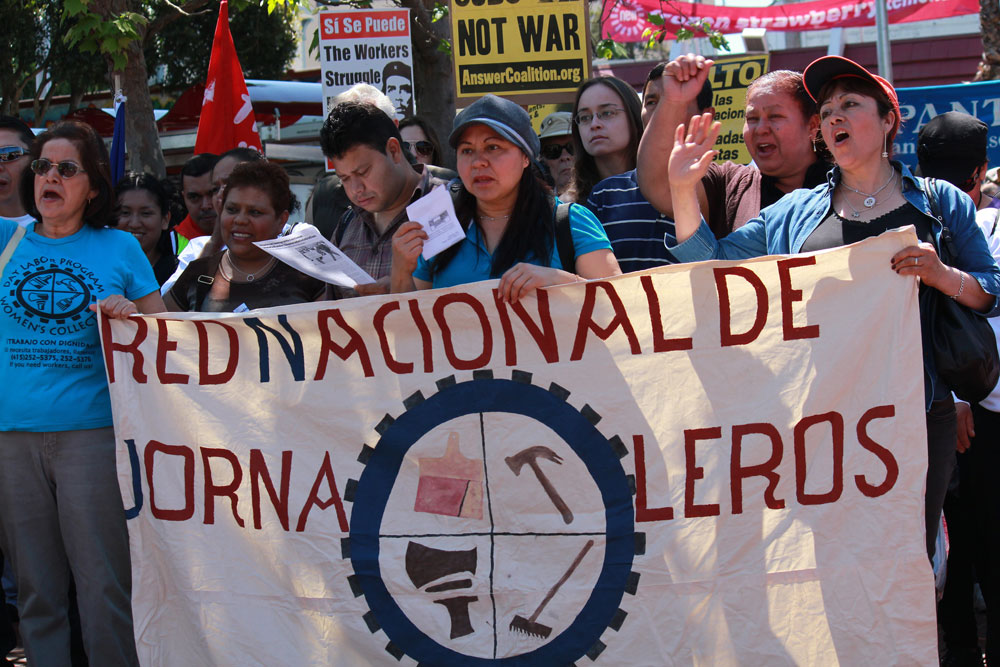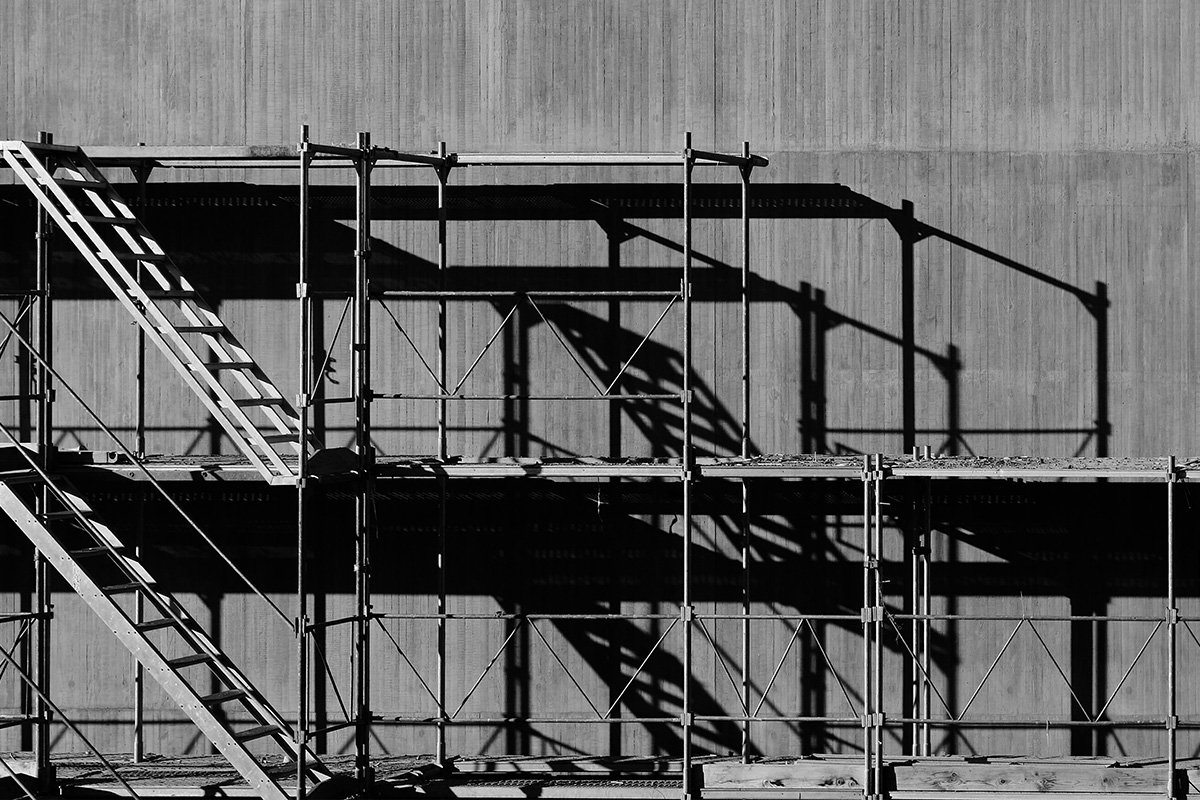
In May, NPQ profiled day laborers (in Spanish, jornaleros), many of whom are on the front lines of emergency response, such as food delivery and mask distribution. Nonetheless, they are often excluded from policy supports, as many of these immigrant laborers are undocumented. Nationally, there are well over 100,000 of them. A national nonprofit’s survey seeks to make these essential workers more visible.
Day laborers get paid by the job, so if work dries up, so does their pay. In the first month of the pandemic, the majority were left without any work at all. A number are supported by nonprofit day laborer centers; about 55 of these centers are affiliated with the National Day Laborer Organizing Network (NDLON), the nonprofit in question.
NDLON is conducting its survey in cooperation with Nik Theodore, a professor of urban planning at the University of Illinois at Chicago. Theodore has written extensively on day laborers. NPQ was given access to the raw data.
It should be cautioned that while at 62 percent the response ratio is much higher than typical, the survey is still ongoing and more detailed information will surely follow. Still, we thought it was important to report on the preliminary data, as this is, to the best of our knowledge, the first survey of national scope on day laborers taken during the pandemic.
The findings reflect and reinforce some trends that are starting to show up in local surveys. For instance, in New York City, a survey conducted by New Immigrant Community Empowerment (NICE)—a member of the NDLON network—found that only 20.5 percent of its day laborer constituents had been able to work during the peak of the pandemic. As a result, according to Manuel Castro, executive director of NICE, and Baruch College sociologist Robert C. Smith, 41 percent of respondents reported being at risk of losing their housing.
“Those at risk lived with an average of 2.2 children, nearly all US citizens,” they add.
Castro and Smith also note that 36 percent of those surveyed reported COVID-19 symptoms, such as loss of taste/smell, coughing, and difficulty breathing.
As the pandemic has subsided, at least in New York City, more workers affiliated with day laborer centers have found employment. For example, in May, the city began shutting the subway system between 1 and 5 am daily for cleaning, ending 115 years of 24-hours-a-day operation. Of course, people needed to be hired to conduct the cleaning. Castro and Smith highlight the case of one such cleaning worker, who notes that at least initially, the New York City subway authority was hardly prepared for the policy change. This worker tells Castro and Smith:
The rags were so filthy, and we had no soap and little water to clean them, so we felt like we were spreading the virus in the subway car by our cleaning…we started on Monday, but they did not give us masks ’til Wednesday…The gloves they gave us were for making sandwiches, not for cleaning! They would break, and there were no more, so we brought our own….I worry: How many people will get sick because these cars were “cleaned” this way?
National Survey: Some Preliminary Data
Founded in 2001, NDLON today is a network comprising member organizations across the US. NDLON seeks to improve the lives of day laborers, migrants, and low-wage workers. Its programs include leadership development and power building, as well as participating in strategic litigation. NDLON aims to combine legal, communications, arts, and cultural support to enhance grassroots organizing.
In May, NDLON began to put together a survey of its members and prepare to serve its members in June. To date, 34 out of an estimated 55 member organizations have responded, a very high response rate of 62 percent. These member organizations estimated that they provide direct services to at least 43,500 people.
One area of the survey focuses on questions regarding exposure to the novel coronavirus. Here, the numbers are high, as was the case with the New York City survey.
A total of 26 member organizations out of 34 responding groups said they had members who had been diagnosed with COVID-19. Nearly two-thirds (22 of 34) said that they knew of members who had not gone to see medical personnel despite showing symptoms of COVID-19, possibly the result of fear of deportation. Nearly one-third of the centers (10 of 34) reported that some of their members had died due to the virus; likewise, nearly a third of the centers (11 of 34) reported that they had had staff and/or volunteers diagnosed as having COVID-19.
Sign up for our free newsletters
Subscribe to NPQ's newsletters to have our top stories delivered directly to your inbox.
By signing up, you agree to our privacy policy and terms of use, and to receive messages from NPQ and our partners.
As with the New York City study, the national survey finds a sharp drop in employment, with national placements in April 2020 roughly one-fifth of what they were in April 2019.
It is also clear that the overall majority of member organizations have had to greatly expand their services. For instance, day laborer centers are not typically food pantries, but 26 of 34 reported having a food pantry service because of the pandemic. Over 90 percent (31 of 34) reported assisting with distribution of masks and other personal protective equipment.
Beyond the Numbers: What Day Laborers Desire
The survey doesn’t just ask yes/no and numerical questions, however. It also asks about funding priorities and leaves room for qualitative responses to the survey as a whole. While most respondents simply gave program names and desired budget amounts, a few went beyond both to lift up some of the challenges that they are facing and to address more broadly their overall goals and vision.
For example, one organization responded as follows:
What do we want? We want men and women to return to work safely. To achieve that, we need to have personnel who can be on the corners talking with the workers. We need community health and safety staff. We want to be able to hire two people at half time to visit the day laborers…and motivate the workers to participate in trainings in person when it is possible or virtual if not, on health and safety, in order to prepare themselves for new work opportunities. We want training to help day laborers protect themselves from COVID-19. We want trainings at the same corners that include labor rights.
A second group observes that a major focus of the work has been working to bring attention to the plight of constituents to local leaders in government, as well the community at large. This respondent adds that, “A particular issue is the increase of domestic violence cases experienced by domestic workers as they are forced to shelter in place with their abusers. We have been referring domestic workers to counseling and law enforcement representatives and working to find safe housing where possible.”
Keeping people in their homes itself, this respondent says, is another enormous challenge, as day laborers “have been hit harder than any other community as they owe months of rent and do not qualify for any federal stimulus” and thus are vulnerable to eviction as eviction moratoria end. This group also points out that in response to the pandemic, “We have had to modify our work in accord with the new realities of having to work remotely. But we don’t have the personnel or equipment necessary in order to extend our reach.”
A third group notes that, “We have been working to organize the workers through virtual asambleas [assemblies] on a weekly basis and provide relief for the workers collaborating with other organizations to provide services. Our goal is to create a worker’s center and hiring hall and provide structure for the day laborers.”
Building for the Future: The Ongoing Struggle for Immigrant Justice
Over the past two decades, the support structure for day laborers has grown markedly. As we noted in May, many day laborer centers are less than a decade old. NDLON itself has only been around since 2001.
On its website, NDLON outlines its response to the pandemic, which amounts to a combination of “prepare for the worst” and “hope for the best.” NDLON observes that the US is already experiencing unprecedented levels of nativism, xenophobia, racial resentment, and dehumanization. In response, NDLON has identified a five-point advocacy agenda: 1) stop immigration enforcement for the duration of the pandemic, 2) dismantle detentions camps, 3) provide medicine for all, 4) ensure worker protections, and 5) ensure emergency aid is available for day laborers and all immigrants, regardless of status.
Over time, NDLON hopes to help its members secure stable funding to plan and invest in staffing, financial management, community outreach, evaluation, and other systems, thereby boosting the network’s ability to provide vital services, increase the network’s reach, and more effectively advocate on the behalf of day laborers.
Right now, though, the focus is directed squarely at supporting day laborers amid the pandemic. NDLON maintains that, “An appropriate national response to the global pandemic must prioritize the health and safety of those who are most vulnerable, including immigrants. However, we fear that vulnerable populations including undocumented migrant workers, poor people, and refugees will be deemed acceptable collateral damage by forces that view them as less than human.”












